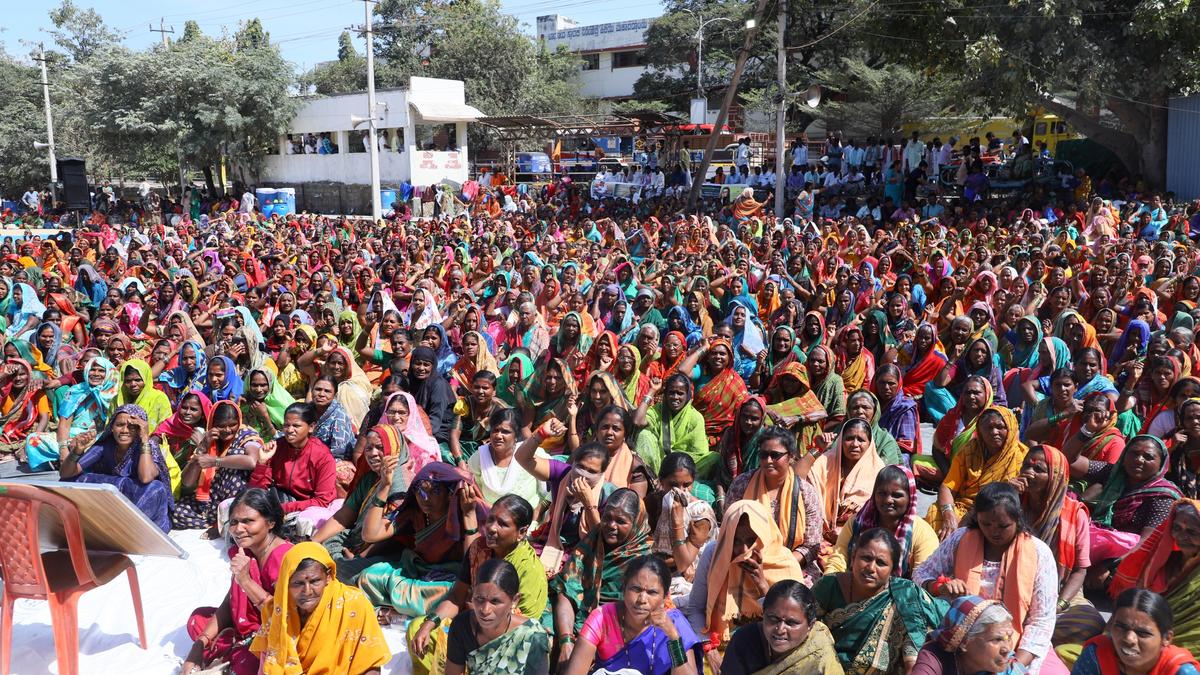Thousands March for Change: Rural Women Demand Action on Education, Prohibition, and Malnutrition in Karnataka
In a powerful display of solidarity, thousands of rural women from Raichur and neighboring districts converged on Saturday to demand urgent action from the government. Their impassioned march and demonstration underscored critical issues plaguing their communities: a lack of quality education, rampant malnutrition, unsafe drinking water, and the lingering effects of the Devadasi practice. This isn't just a protest; it's a clarion call for a better future.
The Heart of the Matter: Key Demands for Rural Transformation
The rally, organized under the Joint Action Committee of Progressive Organisations, brought together a diverse coalition of civil society groups, unified in their shared concerns. The protestors' demands were stark and direct, reflecting years of unmet needs. Central among these were:
Quality Education: A Foundation for the Future
The lack of quality education emerged as a dominant theme. Speakers highlighted the shocking number of vacant teaching positions in government schools across the Kalyana Karnataka region – as high as 75%, with guest teachers filling the gaps. This staffing shortage leaves many students deprived of proper instruction, jeopardizing their educational prospects and their communities’ future.
Malnutrition and Anaemia: A Silent Epidemic
Another pressing concern highlighted was the pervasive issue of malnutrition and anaemia, affecting an estimated 30 lakh people in the region. This underscores the urgent need for improved healthcare services, dietary support, and awareness programs. The protestors demanded the implementation of comprehensive strategies to tackle this critical health issue.
Safe Drinking Water: A Basic Human Right
Access to safe drinking water is fundamental. Yet, many villages rely on dysfunctional RO plants, leaving them with unsafe water sources and an increased risk of waterborne diseases. Speakers pointed out that the restoration of these critical infrastructure is paramount. The provision of safe drinking water was not merely a luxury, but a necessity.
Addressing the Devadasi Practice: A Long-Overdue Step
The plight of women affected by the Devadasi practice also took center stage. Speakers emphasized the need for a comprehensive survey to understand the scale of the issue and develop targeted support for the women and their children. Specifically, they urged the immediate release of pending scholarships to help uplift these communities.
Decades of Inaction: A Call for Accountability
The women protesters highlighted the fact that their struggle has been ongoing for over 15 years. Repeated pleas to successive governments for action have gone unanswered. They argued that despite their efforts, there is a distinct apathy and disinterest among policymakers in acknowledging their genuine struggles. This lack of government attention only serves to highlight their marginalization and the systemic inequalities they face daily.
Government Response: Promises vs. Action
While government officials met with protestors and heard their concerns, the effectiveness of these dialogues hinges on substantive action that reflects true government support. Promises and acknowledgement, absent effective policy change, lack any substantial meaning and are considered empty reassurances.
Protests Continue: A Fight for the Future
With their demands still unmet, the protest movement will continue. The women have announced a commitment to intensifying the agitation should their pleas for educational reforms, comprehensive healthcare, provision of safe water, and the alleviation of malnutrition continue to be ignored. The unwavering determination of the women sends a strong message that their cause will not be abandoned.
Take Away Points
- The protest highlights critical issues affecting rural women in Karnataka.
- Demands include better education, addressing malnutrition, safe drinking water, and support for Devadasis.
- The long-standing neglect of these issues demonstrates the need for immediate government action.
- Protests are set to continue, emphasizing the resolve of the rural communities.









